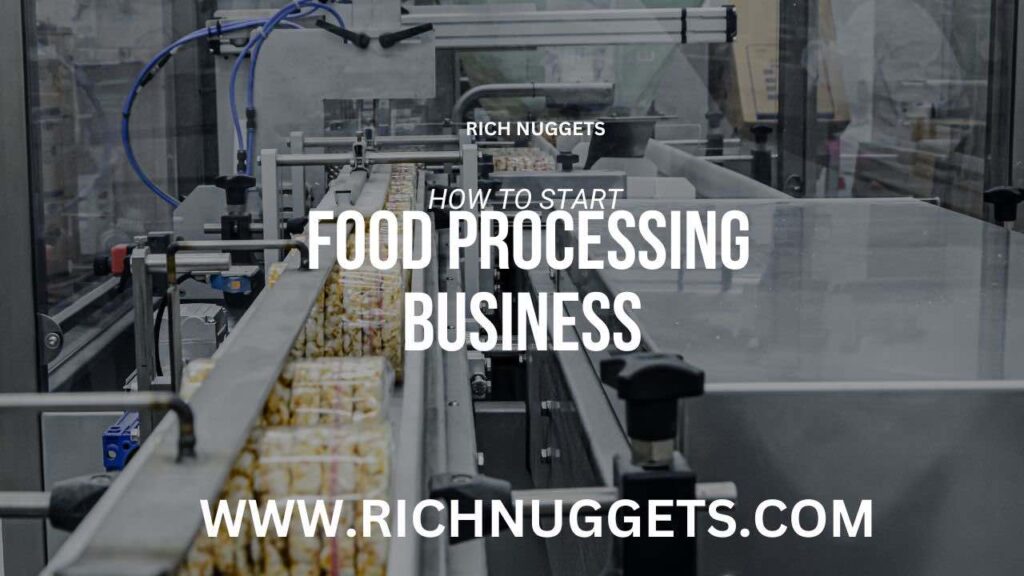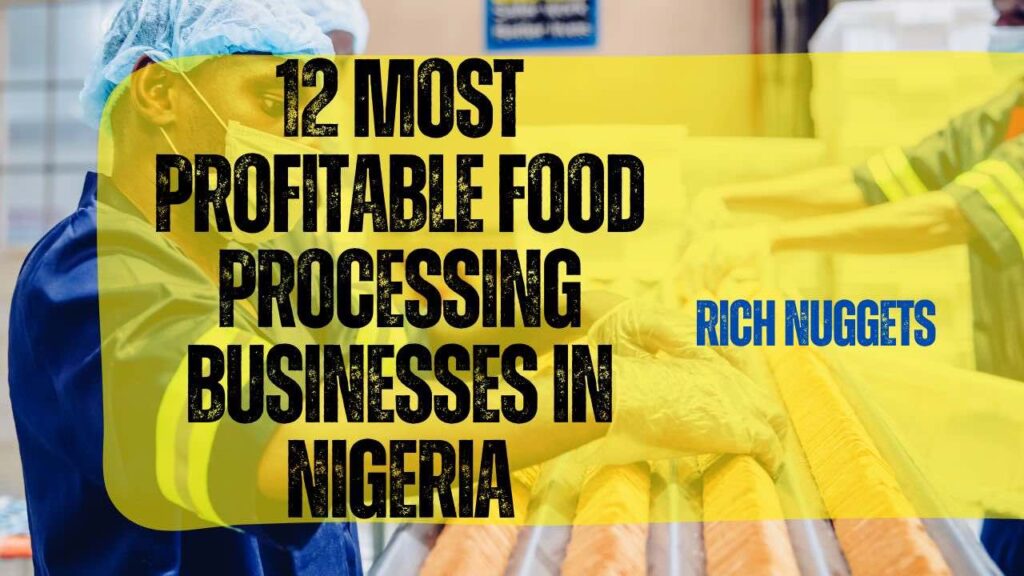In this article, we will explain the steps needed to start a food processing business in Nigeria and also list out the most profitable food processing business ideas in Nigeria.

A food processing business is a value-added business to raw materials within the food supply chain.
Simply put, A food processing business involves the transformation of raw agricultural or animal products into finished food products that are suitable for consumption by consumers.
It is an industry that plays a crucial role in the food supply chain by adding value to raw materials, extending shelf life, enhancing flavor, and making food products more convenient for consumers.
Food processing encompasses various activities and can range from small-scale artisanal operations (that is local manufacturers) to large-scale industrial production.
Examples of food processing businesses include companies that produce canned vegetables, frozen dinners, packaged snacks, bottled beverages, dairy products, and bakery items.
Here are the requirements to start a food processing business or company in Nigeria:
Table of Contents
1. Market Research and Business Plan
Here is the proofread version of your text with some corrections and improvements:
The main aim of market research is to gather information about the industry, particularly the market. This is not just for the purpose of understanding but also to identify the perfect niche for which your food processing business will become known.
The industry is large, and there are various types of food processing businesses one can venture into. Focusing on one specific niche makes it easier for your business to penetrate the market and establish a reputation.
Other purposes of market research, apart from niche identification, include:
- Understanding Your Target Market
- Analyzing the Competition
- Studying Consumer Preferences
Once you have completed your research, the next step is to document your findings, and that’s where the business plan comes into play.
The business plan not only serves as a document for market research documentation but also as a roadmap for navigating the industry. When we say “navigating,” it means it serves as a guide for decision-making in the process of running your food processing business.
Here are additional key elements that your business plan must encompass to make it more relevant to your business:
- Business Goals
- Product Offerings
- Marketing Strategy
- Financial Projections
- Operational Plan
- Market Strategy
- Risk Assessment.
2. Legal Requirements and Regulations
When it comes to legal requirements and regulations in operating a food processing business in Nigeria, you must adhere to all requirements. These requirements include:
Business Registration: Start by registering your food processing business with the Corporate Affairs Commission (CAC) in Nigeria. This step ensures that your business is recognized legally and can operate within the country’s legal framework.
Permits and Licenses: Obtain the necessary permits and licenses required for food processing businesses in Nigeria. These may include permits from local authorities, state agencies, and federal regulatory bodies, depending on the nature of your products and operations. Ultimately visit a business legal consultant to help with guidance on this path.
Food Safety and Quality Standards: Adhere to food safety and quality standards set by regulatory agencies such as the National Agency for Food and Drug Administration and Control (NAFDAC) and the Standard Organisation of Nigeria (SON).
NAFDAC is responsible for regulating and controlling the manufacture, importation, exportation, distribution, advertisement, and sale of food, drugs, cosmetics, and medical devices in Nigeria.
While SON is responsible for assuring that your business products meets standardization and quality.
Just so you know the Food Safety and Quality Standards also require that your facility meets hygiene and sanitation standards, has adequate storage and production space, and is equipped to handle food safely.
Tax and Accounting Compliance: Register for taxation purposes with the Federal Inland Revenue Service (FIRS) to get both your business and employees’ Tax Identification Numbers and ensure that your business maintains accurate financial records. Also, note that VATs are paid to the State internal revenue where your business is located
Export Regulations: If you plan to export your products, be aware of the export regulations and requirements set by Nigerian authorities and the destination country.
It is good and wise to seek guidance from a business legal consultant to guide you through the legal path of starting a food processing and manufacturing business in Nigeria. As it will cost you a lot if you are found wanting of breaking the law that covers the operation of your food processing and manufacturing business in Nigeria.
3. Location and Facilities
Obviously, location and facility are very important in running a food processing business. Without both in place, there can’t be a food processing business.
First, you need to know the factors that can guide you when picking out the best location for your food processing business, They are:
- Accessibility
- Zoning Regulations ( That is, is the area zone for food processing or industrial use)
- Utility Availability: Such as water, electricity, gas, and wastewater disposal
- Compliance with Health and Safety Requirements
- Cost Considerations
When you are done getting the right and best location for your food processing business, you move on to get the required facilities needed to run your type of food processing and manufacturing business.
But there are basic facilities that must be put in place no matter the type of food processing business you venture into. They are:
- Production Areas
- Storage Facilities
- Sanitation Stations
- Quality Control and Testing Areas
- Packaging and Labeling Stations
- Office and Administrative Areas
- Employee Facilities (such as; restrooms, break rooms, and areas for personal protective equipment (PPE) storage.)
- Safety Measures Facilities (such as; fire prevention equipment, emergency exits, and safety signage to protect employees and assets.)
With that in place, you can easily incorporate other specific facilities needed for your food processing niche.
4. Equipment and Supplies of Inventory
Just as the location and facility are both important, so the equipment and supplies of inventory are also very important.
The equipment you will need for your food processing business will depend on the type of food processing business you decide to venture into.
However, there are guidelines and advice that you have to put into consideration when sourcing quality equipment for your food processing and manufacturing business. They are;
- Quality and Efficiency: Reliable and efficient machinery can improve productivity, reduce downtime, and ensure consistent product quality.
- New vs. Used Equipment: New equipment often comes with warranties and may be more efficient, but it can be costly. Used equipment can be more budget-friendly, but it’s essential to inspect it thoroughly to ensure it’s in good working condition.
- Consider Maintenance: Are the parts easily found in the Nigerian market or will there be a need to import them when they are bad? Your budget will determine your choice.
- Ensure that your equipment meets safety standards
As for the supplies of inventory that includes; Quality ingredient sourcing, inventory storage, and supplier relationships. One needs to be careful because it has a direct impact on your food processing final products.
If you get it wrong in your inventory, you might not only lose customers but also be sanctioned by the food regulatory body NAFDAC. And that will cost you millions of Niara and probably a closure of your food factory business.
5. Product Development and Testing
Product development refers to the process of creating and perfecting your food product. It involves designing recipes, selecting ingredients, and determining the overall characteristics of your food item with the sole aim of creating something unique from your competitors.
While product test is to ensure that your food product meets the quality standards set by the Standard Organisation of Nigeria (SON) and appeals to your target market.
The bottom line is, Based on the feedback and testing results, be prepared to make adjustments and refinements to your product.
This may involve tweaking the recipe, altering ingredient sources, improving packaging, or enhancing the product’s marketing message.
in addition, continuously strive to address any issues or concerns raised during testing and improve the overall quality and appeal of your food product.
6. Production Process and Quality Control
The production process and quality control are key to having a successful food processing business in Nigeria 🇳🇬. This step requires establishing a “Standard Operating Procedures (SOPs)”
These Standard Operating Procedures (SOPs) are detailed, step-by-step instructions that outline how specific tasks and processes are to be performed within your food processing facility.
When it comes to your production process, creating and following SOPs is essential for consistency and quality.
Here is how to establish an efficient and effective SOPs:
- Recipe Replication: This ensures that each batch of your product is consistent and meets your desired standards. It is attained by having an exact ingredient measurement, mixing or blending instructions, cooking or processing temperatures and times, and any other critical steps.
- Packaging and Labeling: This ensures that packaging is consistent, labels are applied correctly, and all necessary information (such as ingredient lists, nutrition facts, and expiration dates) is accurate and compliant with regulations.
- Employee Training: Ensure that they understand and follow these procedures consistently to maintain product quality and safety.
- Documentation: Keep thorough records of your production processes, including batch records, quality control data, and any deviations from SOPs. Proper documentation is essential for traceability, quality assurance, and regulatory compliance.
- Establish Quality Control Checkpoints throughout the production process.
7. Distribution and Sales
You need to come up with sales distribution strategies that will get your products to the end consumers.
These strategies include; outlining how you will transport and deliver your food products from your production facility to the end consumers, whether they are retailers, wholesalers, or directly to individual customers.
The transportation channel could be owned by the company or contracted to independent transportation companies or individuals.
8. Staffing
Hiring the right employees with the necessary knowledge and skills is essential for the success and safety of your food processing operations.
The specific staff positions needed for a food processing business can vary depending on the size of your operation, the complexity of your product line, and your production volume.
However, here is a list of common staff positions that are typically required in a food processing business:
- Production Workers
- Quality Control Inspectors
- Machine Operators
- Sanitation Workers
- Food Safety Specialists
- Warehouse and Inventory Managers
- Packaging and Labeling Specialists
- Maintenance Technicians
- Administrative and Management Personnel
- Sales and Marketing Team
- Logistics and Distribution Specialists
- Compliance and Regulatory Specialists
- Research and Development (R&D) Team
- Human Resources (HR) and Training Personnel
Note: The specific number of staff positions and their roles will depend on the scale and complexity of your food processing business.
9. Marketing and Branding:
A well-crafted marketing plan outlines the strategies and tactics you’ll use to promote your food products and build brand awareness. While as, Branding focuses on the visual and conceptual representation of your food processing business, which sets it apart from its competitors and creates a lasting impression on customers.
To effectively and efficiently market your food business products, these strategies should be utilized:
- Online Presence: Through the establishment of a professional website and active social media profiles
- Content Marketing: This includes the creation of related blog posts topics and videos
- Offline Marketing: This includes; print advertisements, brochures, participation in food expos or farmers’ markets, and collaborations with local businesses.
- Paid Social Media Marketing
- Good Public Relations
- Encourage Customer Feedback
Finally, remember to track key performance indicators (KPIs) to measure the effectiveness of your marketing campaigns.
10. Source External Financing
The food processing business requires a substantial initial investment in equipment, facilities, ingredients, and operational costs.
Depending on the scale of your business and your financial capacity, you may need external financing to cover these expenses.
External financing options may include; Bank loans, business grants, investments from private investors or venture capitalists, crowdfunding campaigns, or partnerships with financial institutions.
It’s essential to evaluate your funding needs and explore various financing sources to secure the necessary capital.
But just so you know; A well-prepared business plan that outlines your financial projections and funding requirements can be instrumental in attracting external funding.
This document demonstrates to potential investors or lenders that you have a clear strategy for using the funds and a plan for generating revenue and profits to pay back.
12 Most Profitable Food Processing Businesses in Nigeria

Here are the food processing businesses in Nigeria that are most profitable:
- Tomato Paste Production: Nigeria has a high demand for tomato paste, and processing ripe tomatoes into paste is a lucrative venture. Tomato paste is used extensively in Nigerian cuisine.
- Cassava Processing: Cassava is a staple food in Nigeria, and processing it into products like garri, cassava flour, and starch is profitable due to their widespread consumption.
- Rice Milling: Rice is a staple food in Nigeria which makes rice milling businesses a profitable food processing business.
- Poultry Processing: Processing poultry products, such as chicken and turkey, is profitable due to the high demand for poultry meat in Nigeria. This includes chicken processing plants and egg processing facilities. A good example will be the Obasanjo Farms Nigeria Limited.
- Frozen Food Production: Producing and packaging frozen food products that are sold by cold room owners for retail is a profitable food processing business.
- Fruit Juice Production: Nigeria has a growing market for fruit juices and beverages. Producing natural fruit juices, nectars, and flavored water is a lucrative business.
- Spice and Seasoning Production: The demand for locally produced spices and seasonings for cooking is substantial. Starting a spice processing business can yield good profits.
- Snack Food Manufacturing: Manufacturing snack foods like chips, chin-chin, and plantain chips can be profitable, especially when marketed effectively.
- Bakery and Confectionery: Baking and producing a variety of bread, pastries, and confectionery items is profitable, particularly in urban areas.
- Dairy Processing: Processing dairy products like yogurt, cheese, and milk is a viable business, especially with the growing interest in dairy-based foods.
- Oil Palm Processing: Oil palm is widely cultivated in Nigeria, and processing palm oil and palm kernel oil is a profitable venture.
- Soybean Processing: Soybean processing, including the production of soybean oil, soybean meal, and tofu, has potential due to the versatility of soybeans.
KEY RESOURCES:
- How to Start a Business in Nigeria in 9 Easy Steps
- How to Get a Loan to Start a Business in 11 Steps
- How to Write a Business Plan
- The Complete Guide: How much does it Cost to Start a Business?
READ ALSO:
- How to Start a Supermarket Business in Nigeria (Supermarket Startup Secrets)
- How to Start a Coconut Candy Business
- How to Start a Bakery Business in Nigeria (The Super Easy Way)
- How to Start a Food Business in Nigeria (9 Easy Steps)
Final Thoughts
Starting a food processing business can come with complexity, but with careful planning, adherence to regulations, and a commitment to quality, you can build a successful and sustainable food processing and manufacturing business in Nigeria.
It’s also advisable to seek guidance from industry experts and consider joining local or national food processing associations in Nigeria for networking and support.
And with that, we conclude on the topic “How to start food processing business in Nigeria”.
Discover more from StartBizEasy
Subscribe to get the latest posts to your email.





